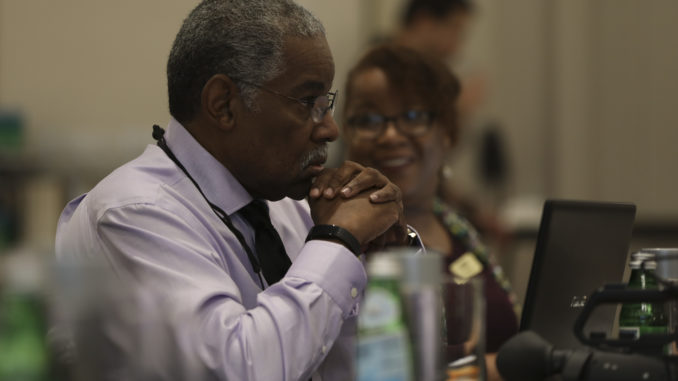
By Jessica Taylor & Elaijah Gibbs-Jones
NABJ Monitor
The NABJ annual business meeting spurred an intense exchange between younger and older members of NABJ over what some younger members say is a lack of a pipeline to leadership.
Despite more than 70% of the organization being millennial and younger members, NABJ’s leadership possesses less than 5% of millennials on its board.
Ernest Owens, CEO of Media Empire and a co-chair of NABJ’s LGBT Task Force, opened the discussion calling for a change based on his personal belief that NABJ’s culture makes it difficult for younger members to serve in leadership positions.
“I personally think that we could do a better job to appeal to younger, working-class members,” Owens said. “People assume that younger members know information about the organization, but they don’t. We need to be active in informing those younger members and getting them involved.”.
The discussion resulted in a motion for a potential change to create a generational pipeline program that supports younger members of NABJ in obtaining leadership positions.
Others argued that the responsibility is on the younger members to seek more ways to become involved with NABJ.
“I came to this convention as a young journalist,” said Betty Baye, a lifetime NABJ member. “We had meetings with no food, no chairs and people were staying in rooms of five, but we did it because we believed in this program. I love the idea of a pipeline program, but it’s a two-way street.”
To support her argument, Baye noted that younger people did not attend Friday’s business meeting.
Owens argued that the time and day of the annual business meeting typically conflicts with the career fair.
“It’s the last day of the career fair at 8:30 in the morning, younger members are attending job interviews, making connections or going somewhere where there’s free breakfast,” Owens said. “We need to appeal to the younger members and market the business meetings the same way we promote the Sports Task Force.”
The discussion intensified as supporters on both sides continued to voice their concerns.
“Things like this aren’t about comfort and convenience,” Baye said. “I was young, too, once. Yes, we partied, but we got up in the morning and came to meetings and asked questions because we were involved.”
“Younger members now don’t know about the founders,” she asserted. “They don’t know the president or who’s running and they don’t seem interested in knowing.”
After the motion was passed, Owens said that he hopes this will be more than just conversation but that it will lead to action.
“I am hoping that within the next 90 days the next president-elect will have advancements in creating the pipeline of leadership program,” he said.
All three NABJ presidential candidates agreed to begin to develop the program within the first 90 days if elected.
Another hot topic raised during the business meeting was the proposed set of amendments to reduce the size of the NABJ board from 14 members to 11.
Members who oppose the amendment have rallied to encourage members to vote “no” for the amendment.
This amendment proposal would effectively remove the academic representative and reduce the number of vice presidents from three to one, eliminating the organization’s original vice president positions for print and broadcast.
Former Academic Representative Michelle Johnson said she is unable to understand why the board would remove a position that is so new. Johnson was the first to ever serve in this position when she was appointed in 2016.
“I was alarmed when I first heard this because we didn’t really understand the rationale to cut the size of the board,” Johnson said. “Maybe you look at some other options versus moving a brand-new position, and it is relatively new, compared to some other seats on the board that are brand new.”
NABJ’s current Academic Representative Milbert Brown echoed Johnson’s sentiments, having voiced his frustrations while serving on the board for the past year after being elected to the position during the Detroit convention.
Brown urged everyone to vote against the amendment during the annual business meeting on Friday morning.
“It’s a problem any time you have a situation where I cannot be a representative,” Brown said. “I basically have a title but no power to change the problem.”
Supporters of maintaining the academic representative position said they believe that many members who want to eliminate the position are not aware of the impact the position makes.
The academic representative carries with it an obligation to understand and report the needs of journalists who become educators who teach future journalists, they said.
During the business meeting, the Constitution and Bylaws committee Chairman Melanie Burney offered some clarification on the process of how the proposals were chosen for the ballot, and how members can vote.
“Our hands are tied, but we hope people have heard us and they understand what we do is important, and we do belong in the room when important decisions are being made,” Johnson said.

1 Trackback / Pingback